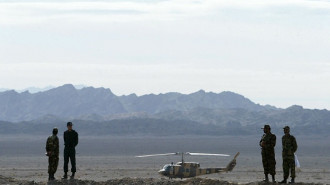'Million woman' march hits streets of Iraq demanding end to violence
The unique all-women marches, which have been organised in key Iraqi cities including central Baghdad, Basra, Nasiriyah, Najaf and Karbala, also aim to highlight women's participation in the demonstrations - which have already brought down a government - and show solidarity with male protesters, organisers said on social media.
The Iraqi Women's League on Tuesday condemned the "excessive violence committed by the Iraqi security services".
Over 600 protesters have been killed and at least 18,000 others the four month period since the predominantly peaceful protests began.
Comment: Sadr's attack on Iraq protests brings out his true colours
Women - who have been participating in and even leading some of the demonstrations - have been subjected to especially particularly brutal violence, the Women's League said.
A number have been killed by the state security services, including prominent activists Sarah Taleb, Huda Khutheir, Zahra Karlusy and Jenan Shahmani.
All four were shot dead during the protests.
Twitter Post
|
At Tuesday's meeting in Baghdad, the league called on the United Nations and the wider international community to "hold the Iraqi government to account" for the violence which has seen masked groups kill scores in attacks on protest camps in recent days.
Videos from Baghdad's Tahrir Square, the epicentre of the protest movement than began on October 1, showed hundreds of women waving Iraqi flags, many of them wearing pink and holding up placards.
One video, purportedly of the protest in Baghdad, showed men flanking either side of the women’s march forming a protective barrier by linking hands with each other.
Twitter Post
|
Similar footage of huge marches in Nasiriyah and Basra showed women chanting for revolution.
Twitter Post
|
The Arabic hashtag that translates as "The country's daughters", has been used to rally support for the demonstrations on social media.
Twitter Post
|
The hashtag, "captures [a] sense of belonging, grievances, but also aspirations of women for an inclusive home where women enjoy their full rights [without] fear of oppression", tweeted Balsam Mustafa, an Iraqi specialist at the University of Birmingham.
The protests, which initially rallied around calls for better employment, public services and and end to the endemic government corruption, have mushroomed into the biggest grassroots uprising Iraq has seen in decades, with crowds hitting the streets of Baghdad and the Shia-majority south almost daily.
Follow us on Facebook, Twitter and Instagram to stay connected

![Palestinians mourned the victims of an Israeli strike on Deir al-Balah [Getty]](/sites/default/files/styles/image_684x385/public/2024-11/GettyImages-2182362043.jpg?h=199d8c1f&itok=xSHZFbmc)


![The law could be enforced against teachers without prior notice [Getty]](/sites/default/files/styles/image_684x385/public/2178740715.jpeg?h=a5f2f23a&itok=hnqrCS4x)
 Follow the Middle East's top stories in English at The New Arab on Google News
Follow the Middle East's top stories in English at The New Arab on Google News
![Fakhrizadeh [AFP] Fakhrizadeh [AFP]](/sites/default/files/styles/image_330x185/public/media/images/774C39F7-8F7A-4D67-B998-27D102FCB4A7.png?h=d1cb525d&itok=j9eGvunV)

